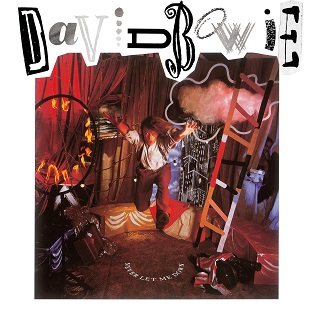Never Let Me Down
I wonder what David Bowie was referring to when he said “Never Let Me Down”: if it was “the old commercial and artistic judgment” then he was sorely mistaken. Since he hopped in the sell-out Ferrari and burned off the competition in 1983, it was hardly trouble-free motoring for Bromley's favourite son, and Never Let Me Down was when the head gasket blew.
|
Down at The Old Vinyl Emporium™
|
The conventional wisdom is that Bowie’s mid-to-late seventies were a wasteland of cocaine, paranoia and Kirlian photography and that by 1983 he had exorcised his demons cleaned up, sobered up, and is gravest indulgences was peroxide, spray tan and skiing. The quid pro quo was an inverted artistic arc: The albums of the seventies got progressively more astounding. It would follow then that a strict regime of health-food and exercise was hardly going to deliver Heroes II. And nor did it.
While, for diehard fans, it was lovely to know that your hero was feeling so much better, by 1987 you started to wish he'd just get back on the coke again. By the half-way mark of Never Let Me Down, Bowie seems to have reached the same conclusion. There is no way the insane tempo of the last part of the album — Bang Bang finishes up at 146 bpm, which is just bonkers — can be put down to a bit too much coffee.
That said, there is truth and candour to be found in the weakest parts of any artist’s catalogue. It’s the most interesting part precisely because profound flaws are there for all to see. And in the wreckage of Never Let Me Down (make no mistake, it is a disaster) we see just such unintentional honesty: Bowie sounded terrified that his creative powers had deserted him — to be sure, they had — and like no other record it felt like he was chasing the game, frantically scuttling to-and-fro like some hopped-up spider, trying everything, going faster and faster in a desperate quest to stay relevant and meaningful — battling but failing to find steady ground among the stylistic shifts going on around him which, for the first time, he cannot control, harness or even understand.
“Shining Star” sounds like he’s trying to be Prince. I doubt The Artist lost any sleep over it. And pity poor, at-the-time-red-hot, Mickey Rourke: I mean, who wouldn’t leap at an invitation to collaborate with one of the most mercurial and gnomic forces in 20th-century culture? How was Rourke to know that his contribution, an anti-drugs rap (Oh, Irony!), would forever be the lowest point of Bowie’s whole catalogue, from and including 1968’s ghastly The Laughing Gnome?
The album’s singles are valiant enough attempts; it’s just not clear at what: Day In, Day Out matches muscular disco-pop with (er) stinging political invective in a lively but scoreless draw. It’s always been a pleasure to be lectured on homelessness by a fellow with a chateau in Geneva. Time Will Crawl has a pretty tune, though it gallops like an unbroken mustang, means nothing. I mean, “Time will crawl until the twenty-first century lose”? What is that supposed to mean? It doesn’t even make sense.
From there, it’s a depressingly downhill journey. The high points are anaemic pop. The low points are almost too ghastly to catalogue: a mystical, eastern-influenced, Spinal-Tapular disco about a Chinese glass spider (around which Bowie based his entire world tour) and poor old Mickey Rourke’s anti-crack rap. Not for the first time, Bowie props up a flaky album with a tough Iggy Pop cover, but it is too little, too late to save this album. When it gets to ’87 and Cry the man sounds categorically out of ideas. “It’s just a one dollar secret,” Bowie sings. But no-one’s let him in on what it is.
Curiously, the two best songs from the session were left off the album altogether. Julie and Girls , both genuinely good Bowie tunes, only saw the light of day as B-Sides. For my money, they both blow out of the water everything that did make the album.
But, silk purse out of sow's ear, and all that.
